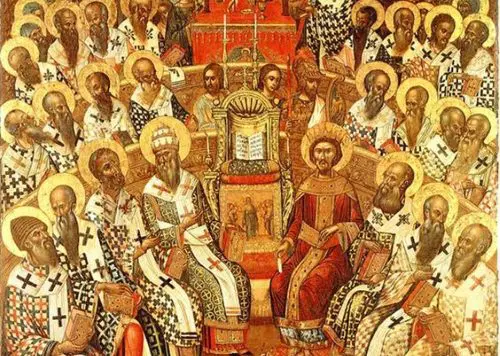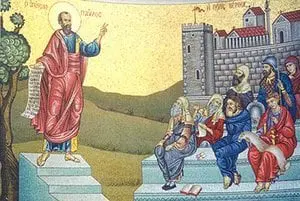The concept of the classical era “archon” (chief, leader, chief) created the last ferment among the Orthodox Bulgarian people. In Classical Greece, the service of strategists immediately referred us to the princes / archons of ancient Greece, Themistocles, Aristides, and Cimon, the earliest examples of strategists who were both political leaders and generals. Pericles was very often chosen as a strategist during his political career, 443-429. BC From 501, a new rule was introduced for the selection of strategists, who were elected annually, one from each phyla. All ten elected had equal status: at the Marathon in 490 (according to Herodotus) the leadership was decided by a vote and each presided on a daily rotation as a polemarch – supreme commander, but from 496 the polemarch, like the other archons were chosen by lot.
The dictionary of liturgical terms in the Greek Church by Leon Clugnet (Léon Clugnet, Dictionnaire Grec-Français des noms liturgiques en usage dans l’Église Grecque, Paris, 1895, p. 22) conveys the meaning of the term “archon” in an Orthodox perspective: 1. A clergyman entrusted with a special ministry or to lead a special service in a cathedral church; 2. “O archon ton ecclesion” is the prefect of the churches, as the patriarchal clergyman was called, whose function was above all to write the texts placed on the antimins, as well as to edit the stauropegs (ie the acts, the imperial charters, authorizing the construction of temples). Today, the Ecumenical Patriarchate has retained some of these Byzantine titles, which are given to laymen and / or clergymen who have distinguished themselves in a certain field, so that modern archons are the leaders in a given endeavor or ministry. To what extent it is possible to introduce such a practice and rite in other local Orthodox churches is not the subject of the present. In no case, however, can these distinctions be regarded as indulgences, and their receipt is not conditional on the remission of sins. Аlthough they give certain rights and impose obligations on their holders.
According to a similar scheme, other distinctions are acquired, such as the scientific title didaskalos (ie Teacher of the Church, roughly equivalent to the medieval Latin doctor ecclesiaticus and doctor angelicus). The didactic was a church official of the Patriarchal Church in Byzantium, whose mission was to explain the Holy Scriptures to the people, as well as to supervise the patriarchal schools. Such a person from the capital’s elite was the Metropolitan of Philippopolis Michael Italic (occupied the diocesan chair 1143-1156), remarkable for his eloquence, called a “monument of knowledge”, who was a kind of Orthodox Leonardo da Vinci – engaged in mechanics, optics, metrics theory of gravitation, music and philosophy (studied Orpheus, Pindar, Sappho, Isocritus, Pyron, Pythagoras). His address to Emperor John II Comnenus in 1138 on the occasion of his appointment as evangelical didactic is known.
The issue of pilgrimages, which are a kind of Orthodox indulgences, is different. Pilgrimage was also paid attention to in some recent studies of the socio-economic and cultural life of the Bulgarians during the Revival. Over the centuries, pilgrimages have had a beneficial effect on human life. They have contributed to the creation and renewal of religious life by consolidating the identity and spiritual unity of human communities in certain areas. A pilgrim is an honorary address received as a tribute to a devotee after a visit to a place sacred to his religion. The etymology of the word in the Balkan languages is related to the name of worship to the Prophet Muhammad and the holy places – Hajj (obligatory worship for Muslims). For Muslims, this is Mecca. For Christians, these are the Holy Land and Jerusalem with God’s tomb. In the past, the title indirectly testified to the qualities of the bearer of this address, both religious piety and wealth and endurance.
In this case we see some traces of the simplifying nature of this type of documents, but they are rather in the direction of certifying the performed pious worship. Because a journey is not a pilgrimage if it does not become a mystical journey, an inner pilgrimage, an effort to get closer and closer to God through prayer and reconciliation. The pilgrimage to the promised place is the fruit of faith and a desire to acquire holiness and renew life. Through pilgrimage, man and God seek and meet each other in a relaxed and mystical way. The Adorer God meets the Adorer. Abraham left his homeland, Ur of the Chaldees, and traveled far away to the land that the Lord had promised him, Canaan (Gen. 12: 1-5). Abraham’s pilgrimage from Chaldea to Canaan is the answer to God’s call to him, and in Canaan the Lord God reveals Himself in the form of three pilgrims who visit Abraham at the oak of Mamre (Gen. 18: 1-8). The Book of the Bulgarian Pilgrims gives us on page 331 a translation of the text of an indulgence by the Patriarch of Jerusalem Abraham from 1776, as received by the pilgrims in the Holy Land: “By the grace of God, Abraham is the patriarch of the Holy City and of all Palestine
Our humility, by grace, and the mercy and authority of the Holy and Life-Giving Spirit, given by our Savior Jesus Christ to His divine and holy disciples and apostles, to bind and resolve the sins of men, telling them: “Receive the Holy Spirit, whom you forgive. sins, they will be forgiven, and to whomever you hold them, they will be retained, and everything you connect and resolve on earth will be bound and resolved in heaven. ” And through them and on us, their successors, when this Divine grace has passed – our spiritual child is forgiven …. everything in which he as a man has sinned and angered God, with word, thought, willingly or unwillingly and with all his feelings: if under a father’s or mother’s oath, if under excommunication a hierarchical or priestly bidet, or as a person under his curse he fell or swore an oath and stepped on it, or connected with some other transgressions and all these confessions of the spiritual fathers and the rule of he accepted them wholeheartedly and tried diligently to fulfill them. All these sins and connections we resolve and have liberated: with the omnipotent authority and grace of the All-Holy and Life-giving Spirit: and all that he left unconfessed due to oblivion, and all that the merciful God forgave him with the prayers of the Most Holy Mother of God and offered Mary and the holy and omnipotent apostle James, brother of God and first saint of Jerusalem and of all the saints. Amen. ”
There was a practice of sending letters of indulgence to other parts, as evidenced by a letter from the Patriarch of Jerusalem to the Protosingle of the Holy Sepulcher, Mr. Paul, dated 15 November. 1850: “We also sent you a hundred letters of indulgence, sending these things to Your Reverence through Hadji Theodoros Parisi of Thessaloniki, who resided here …”
The propagators of anti-pilgrimage were promised eternal damnation and eternal punishment, and in 1728 the Patriarch of Constantinople Paisius had to issue a special encyclical in defense of the pilgrimage tradition, the Orthodox Hajj, whose translation reads: “Christians, clergy and laity , and the spiritual fathers, the hieromonks, who, aroused by wickedness and insufficient piety and greed and selfishness, or diverted from the demon envious of good and good deeds, hinder or break away with vain chatter and words that cool the faith, or by some other means of satanic deception, Christians by going to worship at God’s tomb and giving him alms and gifts, and thereby causing them spiritual harm and harm, and at the Holy Sepulcher causing deprivation of alms to Christian worshipers: these ( Christians), if this satanic and pernicious wickedness and ungodliness and malice do not cease in the future, they will be aphorized by the Lord God Almighty and cursed and unforgiven, and after death unmelted. The stones and iron will melt, and they in no way. They will be paid with the leprosy of Gehazi * and the gallows of Judah, and they will suffer and tremble on the earth like Cain, the earth will dissolve and devour them like Dathan and Abiram ** and they will share the fate of the traitor Judas and the Jews who fought against God, who crucified the Creator of faith. The wrath of God will fall on their heads, their possessions and possessions, their labor and sweat will be exposed to utter destruction and extermination. Above them will weigh the curse of the holy three hundred and eighteen God-bearing fathers of Nicaea and the other councils. They will be condemned to eternal fire and subjected to eternal punishment. ”
Notes:
* Gehazi is the servant of the prophet Elisha, who is mentioned in the history of Sunamkata – 2 Kings. 4: 14-37, and in the story of Naaman (the Syrian), whom he deceived and took a portion of the gift that his master did not take. For this crime, he was punished with leprosy for the rest of his life – 2 Kings. 5: 20-27, (893 BC). The same Gehazi then sees that he tells King Jehoram the great miracles of Elisha, on the same day when God’s providence brought the Sunamka before the king to pray for the fields to be returned to her – 2 Kings. 8: 1-6.
** The sons of Eliab: Nemuel, Dathan, and Abiram. These are those Dathan and Abiram, called to the congregation, who caused trouble against Moses and Aaron, together with the companions of Korea, when they caused trouble against the Lord (cf. Numbers 26: 9); Deuteronomy 11: 6> “And what did he do to Dathan and Abiram, the sons of Eliab, the son of Reuben, how the earth opened its mouth and devoured them before all Israel with their families, their tents, and all living things that belonged to them?”







